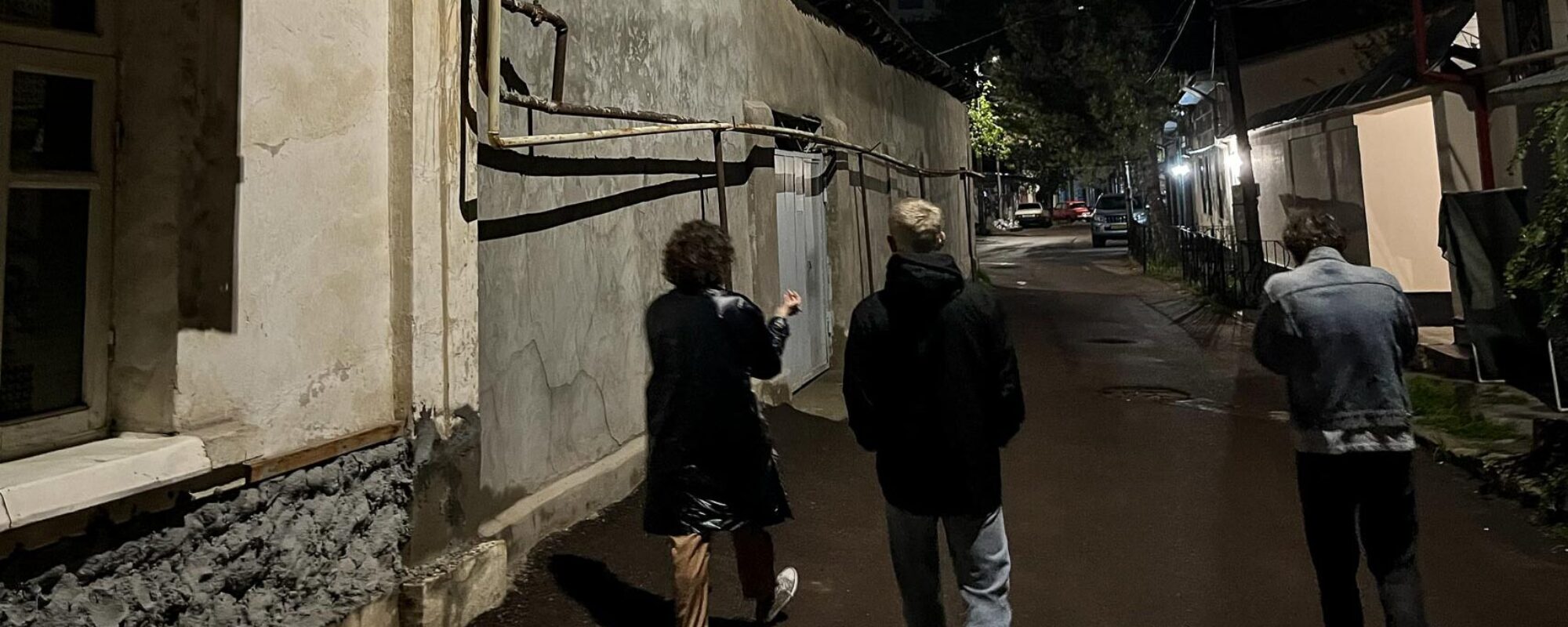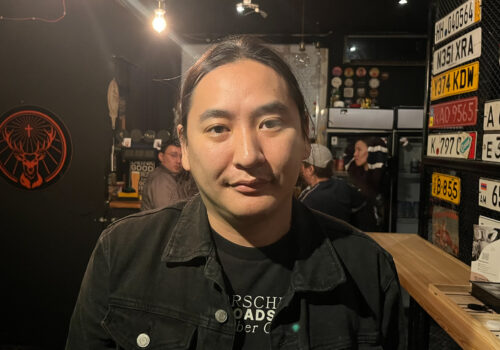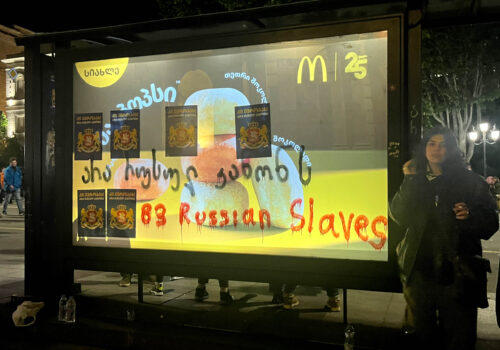TASHKENT — At a certain point during the last decade, a Moscow-born educational entrepreneur named Maxim realized politics were a useless way to foster change in Russia.
Still, he continued to believe “small, helpful deeds”—especially in the field of education—could steer his country toward a brighter future, even if it meant collaborating with Kremlin-connected banking oligarchs or receiving an award from President Vladimir Putin personally.
But the high-profile arrests of some of Maxim’s former colleagues who headed the progressive Moscow School of Social and Economic Sciences, or Shaninka, in 2021 on embezzlement allegations—which critics say were a warning to liberal academic institutions—spurred serious doubts. A year later, Russia’s full-scale invasion of Ukraine dashed whatever optimism remained.
“[The invasion] was an act of complete madness,” the 55-year-old Maxim (who asked to be referred to by a pseudonym) told me in the Uzbek capital over a Kimchi stew in the canopied courtyard of an old Korean restaurant where dog meat was on the menu.
In the month following the February 2022 invasion, Maxim tried to break through the apathy he saw in Moscow with more small deeds. They included fruitless attempts to converse with strangers about the invasion in coffee shops, and spray painting “No to war” on walls around the city.
“It was going nowhere,” he lamented. “[Moscow’s] public had chosen willful ignorance as a coping mechanism, and my ‘No to war’ graffiti would be painted over by morning.”
Maxim fled at the end of March 2022 to France, where he stayed with his son, who teaches at a university there. He scoured a world map until he concluded he could be “useful” in Uzbekistan.
He is now launching Teacher for Uzbekistan, the third in a series of projects he’s managed across Central Asia. Inspired by the nonprofit Teach for America, his initiative places recent graduates from the region’s top universities as teachers in rural public schools.
Maxim is among a small number of Russian academics and educators I met in Uzbekistan and Kazakhstan who had continued working in Putin’s Russia even in the face of growing authoritarianism, making compromises in the hopes of holding on to academic freedom.
Even in the later years of Putin’s reign, the continued financial support of Western-style liberal arts programs and private schools—which emerged after the Soviet collapse—gave hope that academic freedom was indeed still alive.
Until the full-scale invasion of Ukraine.
The Kremlin’s stepped-up efforts to transform educational institutions into propaganda vehicles, coupled with the flourishing of Stalin-era denunciations of opponents of the war, quickly made the climate unbearable. The closure of many liberal arts institutions and appointment of Kremlin-backed rectors at universities once perceived as bastions of liberal thought also prompted the emigration of thousands of scholars.
Alexander Abashkin, a Tbilisi-based coordinator for Harvard University’s Scholars Without Borders, a project that focuses on “rebuilding scholarly communities disrupted by Russia’s war against Ukraine,” told me that some 60,000 scholars and educators—including doctoral students whose studies were disrupted—have left Russia.
Some tried to go to the West, but an increasingly competitive academic job market and need for professional use of English and other languages have made integration difficult.
But the large majority of mid-career scholars and educators chose Central Asian countries as their destinations due to their less competitive markets, growing economies, emphasis on private education and widespread use of Russian as the lingua franca.
While the departure of highly qualified, free-thinking academics, teachers and educators presents a significant loss for Russia, countries like Uzbekistan and Kazakhstan stand to benefit from the expertise they bring.
‘Thank God for Soros’
The fall of communism in 1991 brought Western educational practices to Russia, from private boarding schools for the children of Moscow elites to university liberal arts programs. But Russia’s teachers and professors became some of the lowest-paid professionals in the country.
Vera, 45, and her husband Sergei, 50, both taught international relations at state universities in Moscow and in their southern Russian hometown, which they asked I not disclose because of security concerns.
With monthly salaries of around $200, the couple relied on academic grants to put food on the table. Much of their income came from Open Society Foundations (OSF), the MacArthur Foundation and others international NGOs.
“Thank God for George Soros!” Vera quipped about the Hungarian-born US financier and philanthropist who founded OSF.
Both foundations are officially “undesirable organizations” in Russia after enactment of the Kremlin’s 2015 law that led to the shutdown of several such NGOs in Russia. Soros became the target of vitriolic anti-Semitic propaganda conspiracy theories later picked up by the American far right.
I met the couple at an Indian restaurant in the center of Almaty, in Kazakhstan, where they now teach history and international relations at separate universities and where their adopted 13-year-old son attends a school with instruction in Russian. They were eager to talk but Vera’s nervous jokes about how she vetted me online revealed the fear they brought with them from home.
Although they struggled to make ends meet in Russia, they recalled their academic careers fondly. During her doctoral studies, Vera said, she would wear secondhand shoes until the soles wore through and eat only buckwheat for weeks. But a ‘rich academic life” outweighed the material hardships, compelling her to stay in the field.
The stagnant Soviet educational system was giving way to something more fluid and open. Despite once having been robbed of his graduate school stipend in Moscow, Sergei felt the 1990s and early 2000s were times of “infinite growth and potential.”
The ability to travel to academic conferences and earn grants to teach abroad also fueled their appreciation for the profession. During their two decades as professors at Russian state universities, Vera and Sergei spent time in several European countries and the United States and even taught in Japan for a year.
Raised in a working-class family, Vera described herself as politically engaged. During Russia’s 2012 presidential election, which brought Putin back to power after he had temporarily stepped down to short circuit the country’s constitutional presidential term limit, she volunteered as an election observer. Witnessing blatant incidents of ballot-box stuffing made her feel disillusioned, she said. Living far from Moscow’s politics in a southern city with a population of just a million further fueled feelings of helplessness.
Vera moved to teaching history while Sergei continued with international relations. Following Russia’s 2014 occupation of Ukraine’s Crimea region, he told me, any discussion in the classroom that challenged the state narrative would result in disciplinary action, forcing him to avoid the topic altogether.
Still, Vera said, while Putin’s authoritarian inclinations were becoming “crystal clear,” they were a “tolerable evil” compared to the war that has since killed tens of thousands of innocent Ukrainians.
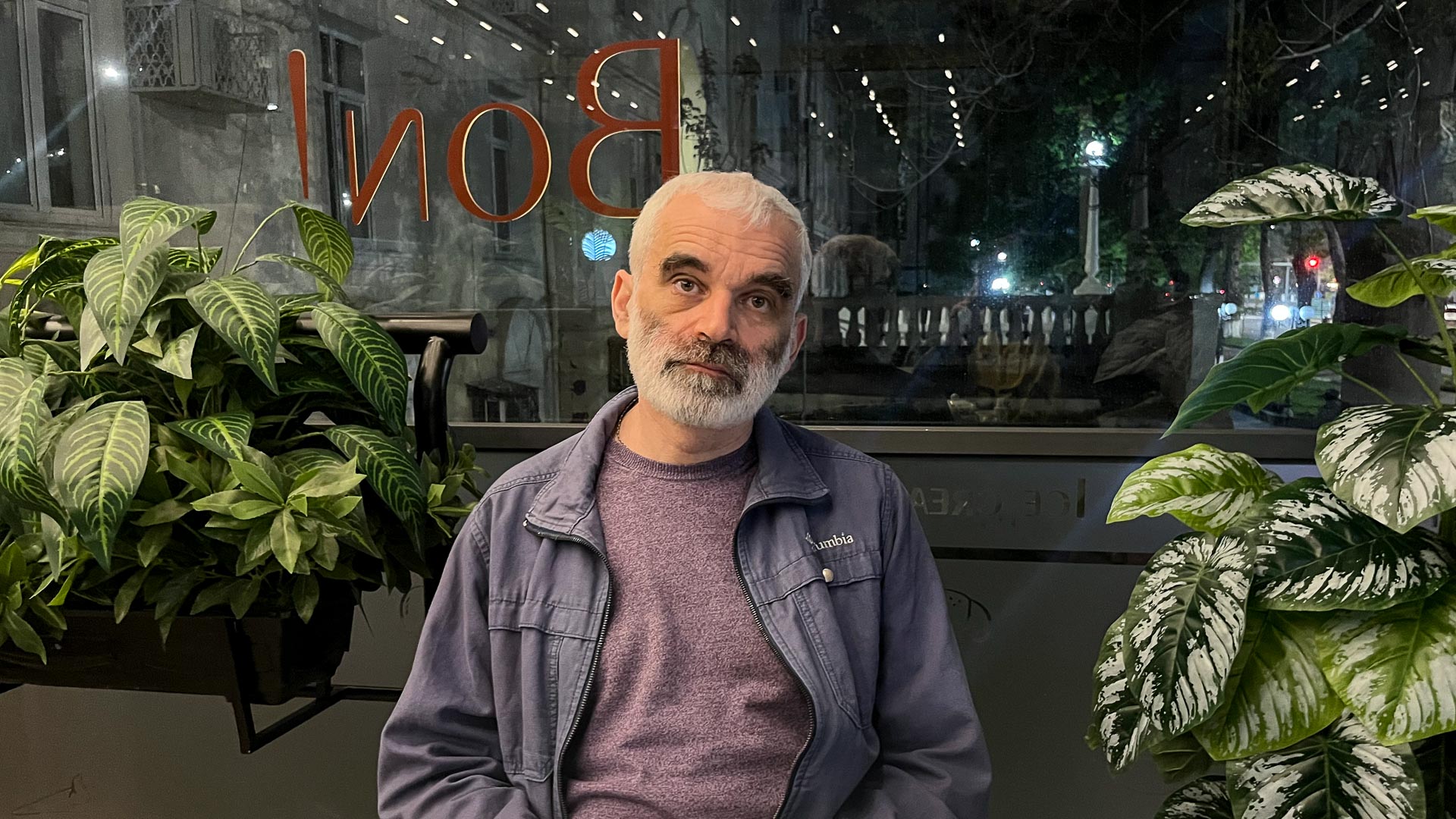
Private education in Moscow
Dmitry Schnoll, 58, the director of a private school in Tashkent, earned a salary of $40 a month as schoolteacher in Moscow during Russia’s 1998 financial crisis, when the government defaulted on domestic debt.
His financial situation drastically improved in the 2000s when he began working for newly opened private schools for gifted children that were importing Western teaching methodologies. At a cafe on the corner of a broad, Soviet-era boulevard in central Tashkent, he spoke in his high-pitched voice, his gray beard contrasting sharply with dark, bushy eyebrows.
The schools resisted censorship and propaganda. In 2008, after Russia invaded neighboring Georgia, students at one private school proposed organizing a drive to send books to Georgian children, probably inspired by their liberal parents, he said.
At the Letovo School, part of the International Baccalaureate (IB) program and ranked first on the IB website in 2022 and 2023, Schnoll and his fellow teachers regularly took their students to Moscow’s Gulag Museum.
Despite the liberal inclinations of such schools, their prestige also attracted the children of various government ministers. But unlike many state schools where corruption is pervasive, these merit-based academies did not accept bribes for acceptance. The son of Vladimir Medinsky—who served as Putin’s notorious culture minister from 2012 until 2020 and prevented the distribution of the 2017 comedy film “The Death of Stalin” in Russia for its “historical distortions”—was rejected in his first attempt to apply to the school.
He was admitted after a second try, however, and the boy’s parents placed him on a special track to prepare him for a higher education in the United States. “This speaks volumes about our elite; about the [strong anti-Western sentiment] they project in public and what they desire in private,” Schnoll said.
Even amid government-stoked militarism that swept Russia in the aftermath of the Ukraine invasion, the Letovo School has refused to become a vehicle for pro-war propaganda. To instill patriotic values in younger generations, the Education Ministry mandated that schools nationwide introduce compulsory weekly patriotic lessons known as “Important Conversations.” The school quietly adapted the lessons, ensuring they were devoid of pro-war or pro-regime propaganda, turning them into Russian history lessons instead.
I asked Schnoll whether he thought such compromises might create the illusion for the educated public that their lives remain unaffected by the war against Ukraine.
He didn’t see it this way.
“What they say on Russian state propaganda networks is barbarism,” he said. “But a young man opening, let’s say, a coffee shop in Moscow is not barbarism. A coffee shop is a place where people can exchange ideas, fine tune a craft such as coffee brewing. It’s important for such spaces to keep functioning so that if there is a change, there will be a foundation to build on.”
Unlike my other interviewees, Schnoll was less sure about his intention to stay outside Russia even if Putin were to remain in power. He resisted labeling his departure—motivated by a desire to protect his sons from military conscription, he said—as emigration. After struggling to integrate in Tashkent, the sons—one a doctoral student and the other in high school—returned to Moscow to continue their educations.
Teacher for Russia
The decisive manner in which Maxim—the educational entrepreneur who worked for Teachers of Russia and had dealings at some of the highest echelons of Russian power—turned his back on his country after the invasion seemed surprising.
His first teaching experience, in the mid-1990s, took him to Adygea, a region of Russia’s North Caucasus. His aspiration to become a physicist was put on hold by the birth of his first son in 1991. On realizing he couldn’t support a family on a teacher’s salary, he rented his Moscow apartment and relocated with his wife and child to the more affordable mountainous region.
He taught physics and astronomy at a village school for $12 a month. On weekends, he and his then wife would pan for gold in a nearby river “like in the novels of Jack London.” But the modest salary and sense that his time as a teacher did not produce “results” deterred him from continuing in education.
While Russia’s integration into the global economy brought grants for those who remained in education and academia, it also spurred significant demand for business infrastructure. So Maxim soon joined a friend who had founded the Headhunter Group, which became Russia’s top recruitment firm. Together with international partners, they introduced Western executive-assessment practices, previously little-known in Russia, and hosted professors from leading business programs including from Stanford and Harvard.
By 2012, they had become one of the world’s top five recruitment companies.
“We never felt we were behind our Western colleagues,” he said. But by 2014, after Russia occupied Crimea and fomented a war in parts of eastern Ukraine, Maxim felt the opportunities in Russia’s business sector had reached their ceiling. “Business is about optimism and growth, which are impossible in a [geopolitically fraught] climate,” he said.
A year later, he was invited back into the field of education by the NGO Noviy Uchitel (New Teacher) to help kickstart Uchitelya Dlya Rossii, or Teachers for Russia. It recruits recent graduates of Russia’s top universities in Moscow and St. Petersburg to spend two years teaching at schools in more remote regions.
The project aims to address staffing shortages and motivate students in struggling schools. With salaries in some of those schools falling below the poverty line, Teachers for Russia provides participants with extra stipends as well as participation in mentoring programs.
In 2018, Maxim enrolled in a competition called Leaders of Russia, designed by Putin’s top aide Sergei Kiriyenko, to raise money and attract donors for the Teachers for Russia initiative. In addition to a grant of 1 million rubles ($11,300), his victory in the competition earned him a spot among a select group of students accepted into a free Master’s in Public Strategy program at the Skolkovo Institute of Science and Technology (Skoltech) near Moscow.
Skoltech, a private science and business institute established in 2011 by the Russian-Armenian oligarch Ruben Vardanyan, partnered with the Massachusetts Institute of Technology for several years until MIT exited over the war against Ukraine.
As an additional reward, Maxim and his cohort had the opportunity to meet with Putin in person. Despite “appearing very ill with the flu and disinterested” and presumably preparing for his inevitable 2018 reelection, he said, the president spent two hours speaking with the competition winners.
Maxim’s participation in the Leaders of Russia competition caught the attention of German Gref, the CEO and chairman of the country’s largest bank, Sberbank. Gref eventually became Teachers for Russia’s largest patron. However, the development backfired on Maxim, as the banker informed him there was “too much of [him] in the project.”
It was curious to hear Maxim casually mention politicians, oligarchs and business moguls like Kiriyenko, Gref and Vardanyan—some of whom have been named in a major corruption investigation, others implicated in the 2020 near-fatal poisoning of opposition leader Alexei Navalny—as ordinary people with whom he discussed ideas. But he seemed to distinguish between them and Putin himself.
“They are not Putin,” he said. “And there was even a sense of hope that such technocrats as Kiriyenko, Gref and [current Prime Minister] Mikhail Mishustin would inherit the country from Putin.”
Maxim told me he was certain that Gref, with whom he described a close working relationship, opposes the war. “How Gref perceives the world is secondary,” he said. “In Russia’s bureaucratic system, the chief is always correct. A subordinate can never question the decisions of the chief, and even if the chief missteps, the subordinate must bear the mistake too. Russia’s power vertical system stipulates 100 percent loyalty, and each member is responsible for their piece of the pie, which in Gref’s case is Sberbank.”
Ultimately, the high-profile criminal cases—which he believes were politically motivated—against acquaintances from Moscow’s liberal Shaninka Institute and a friend from the Education Ministry pushed him out of his field.
Maxim recalled how during his last meeting with Education Minister Sergei Kravtsov, the official quietly admitted off-record that three-fifths of the country’s teachers lived below the poverty line. The admission further reinforced Maxim’s feelings that education was doomed under the Putin government.
“I was only politicized in the sense that I deeply wanted Russia to be part of the Western world,” he told me. The war in Ukraine rendered such aspirations pointless.
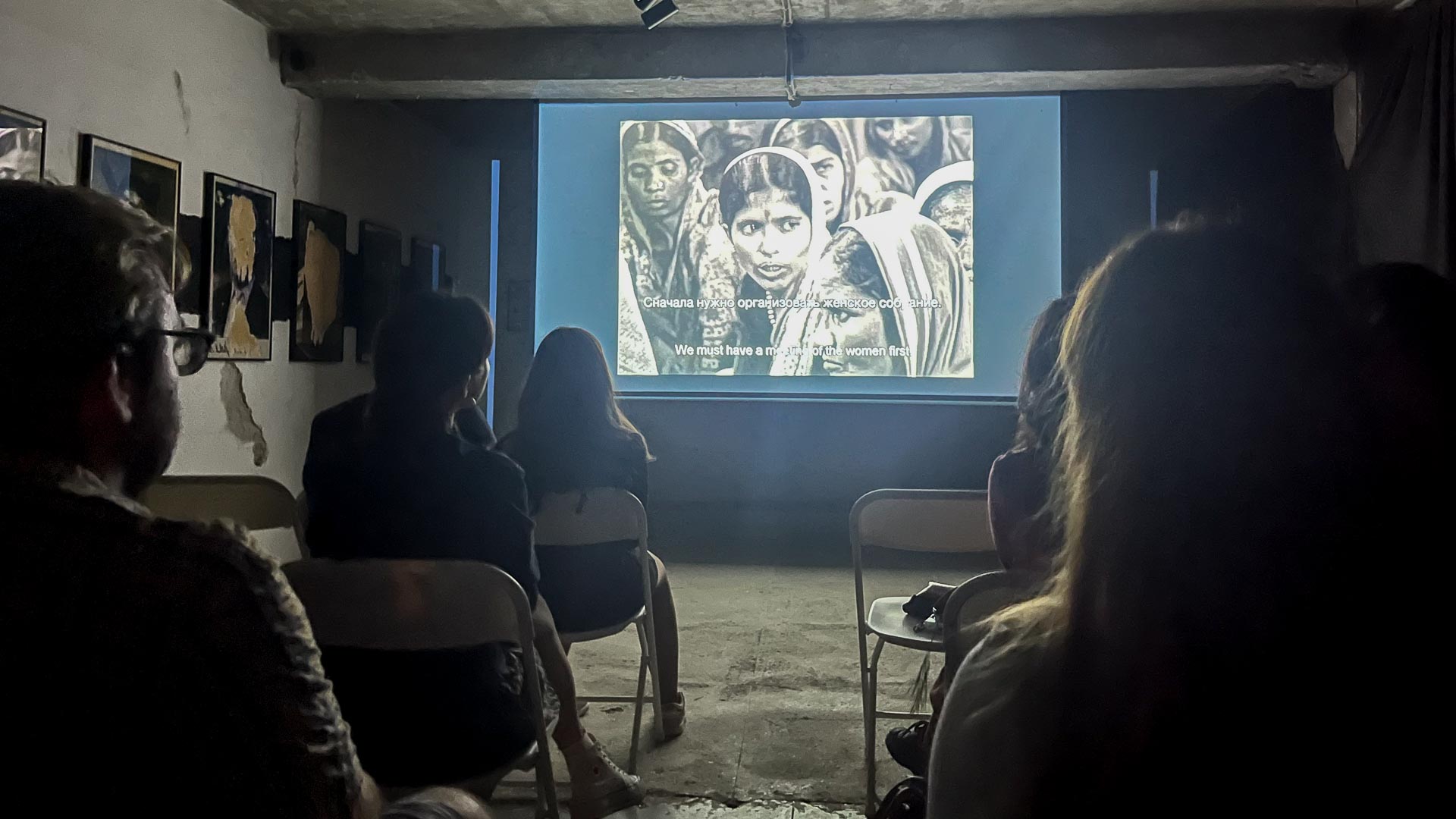
From southern Russia to Kazakhstan
Sergei, the international relations professor, fell into deep depression in the early days of the invasion, spending days lying on the couch in his small apartment, doom-scrolling on his phone. His wife, Vera, who lost her first child in an incident she declined to describe, still referred to the war as “the worst event of her life.”
After new laws were implemented that criminalized criticizing Russia’s invasion, the couple decided they would leave the country—which increasingly resembled something “too close to fascism,” they said. “You just begin to realize that your country is killing so many people and that it could last for years,” Vera said.
A chatty person, Vera became frightened that something she might blurt out—even unintentionally—in a classroom setting could land her in prison. “I could only think of my adopted 13-year-old,” she said, “and that if I’m arrested, he’d end up back in an orphanage.”
At one of the two universities where he taught before emigrating, Sergei was warned that some students might inform on professors who spoke out against the war. State university administrations increasingly pressure professors to demonstrate support for the war. “We felt like Russia was actively reliving the 1930s,” Vera said, referring to the period of dictator Josef Stalin’s Great Terror.
Independent Russian media outlets have chronicled countless cases of students having their diplomas revoked or professors losing their jobs over anti-war comments since the start of the invasion. Classrooms have become microcosms of a police-state society, where any participant—student, teacher or professor—could be tasked with keeping a watchful eye on their peers or pupils.
“We never imagined that all this time, our tolerance of this political regime would result in the deaths of so many people in a neighboring country,” she continued. “Still, I understand people who remain silent: would it have been worth it for our child to end up in an orphanage just for us to speak out?”
In Kazakhstan, they found respite from their struggles. Both had already studied Central Asia as historians, and Vera’s dissertation involved the country’s history.
After having their academic qualifications approved in advance, they left Russia in August 2022. They chose Almaty partly because they wanted their teenage son, who struggles with learning disabilities, to attend a Russian-language school.
Outflux of academics
Beyond its totalitarian descent on public universities and schools, the Kremlin has made great efforts to shut down or co-opt liberal education programs designed after the collapse of the Soviet Union, as well as international exchange programs.
Russia’s withdrawal from the Bologna Process, a European framework that ensured participant countries would uphold a certain level of comparable academic quality, rolled back decades of efforts to integrate the country’s academic world into the West.
In 2023, St. Petersburg State University terminated its Liberal Arts and Studies program, renowned for its decades-long partnership with America’s Bard College, which boasted exchange programs for American and Russian students.
The Shaninka institute replaced its former rector, economist Sergei Zuev, a year after he faced what critics believe were trumped-up embezzlement charges. Cases such as these have sounded the alarm throughout the Russian academic community, prompting a large exodus.
Many seem to be getting by in exile.
Harvard’s Abashkin, who has surveyed exiled scholars with questionnaires, said a third of his respondents—exiled academics and educators—have “happily adapted,” finding academic jobs at local universities or remote teaching jobs at places such as the Free University.
Another third are “in the process of adapting,” working in karaoke bars, bookstores and other service jobs while searching for academic positions. The final third, with no stable sources of income, feels doubtful about perspectives abroad.
Abashkin does not see that as a major issue.
“It’s been only two-and-a-half years since their departure from Russia, and in historical perspective, that’s a very short speck of time,” he said. Scholars are finding ways to adapt, he added, and the situation is “absolutely not tragic.”
“They’re not like the emigres who fled the Russian Revolution, who would spend time betting on cockroach races in Istanbul,” he said, referring to the peculiar practice some Russians who fled the Bolsheviks 100 years ago engaged in to pass time.
Remote work has helped many Russian emigres, including scholars, to stay afloat. Still, Abashkin said many Russian scholars abroad will eventually have to prepare to downgrade or undergo requalification programs.
Not all sociologists and historians can remain in their fields, especially if they choose to live in European countries or the United States, where the academic job market is competitive and command of the English language a minimum requirement. Only well-known scholars have managed to secure short-term contracts at major American and European universities, Abashkin said.
Abashkin is also part of a wider cohort of experts working to establish institutions for Russian students abroad. Montenegro has become home to three new Russian “universities in exile,” where a few dozen Russian professors—including several from the Shaninka institute—have found work.
“Many have taken on two responsibilities: continuing teaching, while also creating new infrastructure for more families with students to go there,” he said. With Bachelor’s and Master’s programs, the universities in exile conduct courses in both Russian and English to help further integrate young students into the West.
Such new institutions are part of a broader mission to preserve educational capital abroad, he added, to “prepare a new generation of scholars who can return to Russia and play their part in restoring the educational system.”
Meanwhile, universities in Central Asian countries have become popular alternatives for older mid-career scholars. Kazakhstan is perhaps the largest hub where Russian scholars have been able to find work, according to Abashkin’s survey.
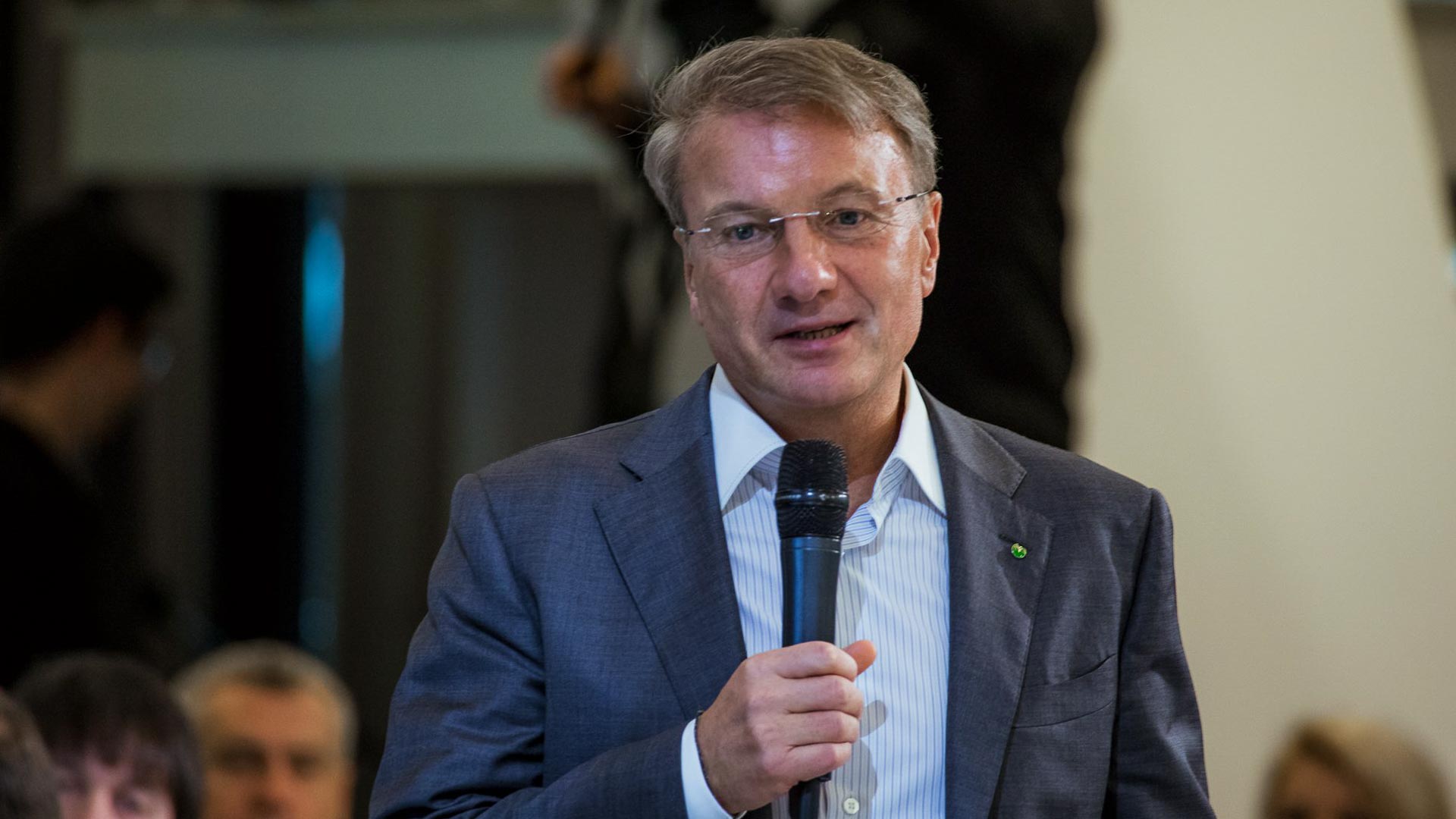
Teaching in Central Asia
Still, many of Sergei and Vera’s peers in Russian academic circles hesitated to look for work in Kazakhstan because they were afraid the repressive climate there could limit their academic freedom. The nonprofit Freedom House categorized the country as a “consolidated authoritarian regime” in its 2024 report.
Vera rejected such assumptions. “The level of academic freedom here is incomparably better than in Russia,” she said. “But if more Russians knew how good it was in Kazakhstan, the job market would be even more competitive.” At her university in Almaty, she is among five professors who arrived from Russia after the invasion.
Sergei, who now teaches at a Kazakh language university, is the only Russian in his faculty. He conducts courses in English, and his fellow professors help translate the Kazakh language faculty meetings.
As with Russians in other professions who fled to Kazakhstan, Sergei and Vera have been welcomed warmly by their colleagues. But Vera expressed sadness at the colonial “inferiority complex” her peers exhibit about their own academic institutions when engaging with Russian scholars.
Under the Soviet Union, Russia—the most powerful of the USSR’s 15 republics—and Moscow in particular were considered the epicenters of thought and opportunity. The others were typically considered peripheries. Even 30 years after the collapse of communism, such sentiments persist.
After she taught her first university course in Almaty, a Kazakh colleague asked her how she felt about the students. “They’re probably not as smart as your students in Moscow,” she told Vera in a bashful tone.
As a historian of the region, Vera understands the atrocities Kazakhs suffered under Moscow’s colonial policies. In the early 1930s, the Kazakh Republic suffered a brutal famine partly brought by forced agricultural collectivization policies. Some historians have argued that the man-made starvation, which reduced the Kazakh population by roughly 50 percent and made its members a minority in their own country, should be recognized as genocide according to the United Nations definition. “I have no idea how Kazakhs don’t smack us in the face!” Vera said. “Estonians, Latvians, Lithuanians generally don’t like Russians, but somehow the Kazakhs still tolerate us.”
At a certain point in our conversation, I asked how, as international relations scholars, she and Sergei respond to Putin’s claims his invasion of Ukraine was justified by the “existential threat” supposedly posed by NATO expansion toward Russia’s borders. “Of course, Putin wasn’t ‘required’ to do this,” Sergei said. “Ukraine is denuclearized nation. It posed absolutely no threat to Russia.”
“The trajectory of this war perfectly demonstrates that it was not in NATO’s interests whatsoever,” Vera added. “Look at how [the West] restrains itself, refrains from attacking Russia, gives incremental support to Ukraine—they’re clearly afraid of escalation. The West wanted nothing more than economic integration with Russia.”
The ‘evacuees’ of Tashkent
In Uzbekistan’s capital Tashkent, evakuanty, “evacuees,” perhaps takes the mantle of most location-specific colloquial expression for Russian emigres.
Evakuanty originated in World War II, when the Soviet authorities evacuated thousands of intellectuals, workers and members of the middle class along with their enterprises deep into the heartland and far from the front lines. Those people were “displaced, but not stateless,” as described by historian Rebecca Manley. “In official Soviet parlance, moreover, they were ‘evacuees,’ not refugees,” she wrote.
While Tashkent was just one of many locations, including Almaty, where evacuees were resettled, the Uzbek capital emerged as “the most sought-after site of refuge that seemed to possess an almost magical appeal to the evacuees, even though most had never been there,” Manley added. Notable figures among the original evacuees included the renowned Russian poets Nadezhda Mandelstam and Anna Akhmatova.
The events had a lasting impact on the city’s demographic makeup. Many of the locals I met, primarily members of Tashkent’s creative community, hailed from diverse backgrounds, including people of Russian, Korean, Tatar and Ukrainian descent.
Although many former Soviet republics experienced a window of freedom after the collapse of the USSR, the long rule of dictator Islam Karimov until his death in 2016 prolonged “Soviet, totalitarian stagnation, especially in the field of education,” Dmitry Schnoll told me.
Although remnants of Karimov’s police state still exist—several cultural events I attended were disrupted by police—Tashkent has experienced something of a cultural revival under his successor Shavkat Mirziyoyev. That, combined with the city’s multicultural history, has facilitated the integration and initiatives of the new Russian arrivals.
Fearing the risks the full-scale invasion of Ukraine posed his two sons, both of military conscription age, Schnoll subscribed to a Telegram channel that helps Russian teachers find vacancies abroad. “When I signed up, there were 300 subscribers,” he said. “Now it’s in the thousands.”
Back at the Letovo School in Moscow, teachers decided during faculty meetings that they would not discuss the war in front of the children, some of whose parents could be government officials. By May 2022, Schnoll had found a vacancy for director of a new private school in Tashkent and soon became part of roughly 10 percent of his school’s faculty that left Russia. Inspired by the possibilities of having the freedom to implement his own changes to the structure and culture of a school, he signed a three-year contract.

Echoing Vera’s observations of Kazakhstan, he said his Uzbek colleagues exhibit what he described as a “colonial complex.” His colleagues “suffer from very low self-confidence, often remarking that their own children are ‘incompetent,’” he said. “They lament the departure of many nationalities after the Soviet collapse, including Jews, Armenians and Russians, as a major intellectual loss.”
Schnoll said he often parries such sentiments by explaining that they may have arisen from historical context. His appreciation for his work in Tashkent partly stems from a desire “to return something to the people of Uzbekistan, who suffered from our colonial policies and whose compatriots face daily discrimination in Russia.”
For Maxim, the fact that his newly adopted home is still in the early stages of moving past Karimov’s long dictatorship also presents a window of opportunity. Having already launched Teacher for Kazakhstan and Kyrgyzstan—programs modeled after Teachers for Russia—he’s on the verge of launching the same project in Uzbekistan. “Uzbekistan now resembles Russia in the 1990s and early 2000s,” he said. “What happened under Karimov just froze the country for 25 years.”
Although his colleagues accept him warmly, he said, they seem suspicious of his willingness to take part in such an initiative for no pay. “I am doing things that were simply not allowed or were unthinkable in this country a few years ago,” he said.
A return to Russia?
There would need to be a “categorical change” in Russia for Maxim to consider returning, he told me. “Even if Putin dies, I wouldn’t rush back,” he said, adding that he feels no longing for home.
Vera and Sergei, who recently acquired Kazakh residency permits, known in Russian as a vid na zhitelstvo, or VNZh, responded to a question about their possible return with a bureaucratic pun they devised. “PPZh—poka Putin zhiv,” or “while Putin lives,” will define the length of their exile, they said.
Unlike Russia, Kazakhstan feels like a flourishing country with hope, they said, indicating they intend to stay until their child finishes school, and meanwhile look for other academic positions abroad.
Meanwhile, Schnoll, who’s contracted with his school in Tashkent for another year, didn’t rule out the possibility of returning to Russia in the near future. There’s still room to maneuver back home, he believes, even under the increasingly restrictive conditions.
He pointed to a series of diaries he recently read documenting the Stalin-era USSR. “Soviet citizens silently disagreed with what was happening in their country, even if only through signals,” he said, “and they continued to live somehow.”
“Too much good” has been done in Russia since the Soviet collapse to allow it to simply vanish now, he told me. “If roughly 1 million left Russia after the war, the remaining 142 million need to stay and do something so the country doesn’t transform into another North Korea.”
Top photo: An old district of Tashkent on an April evening

